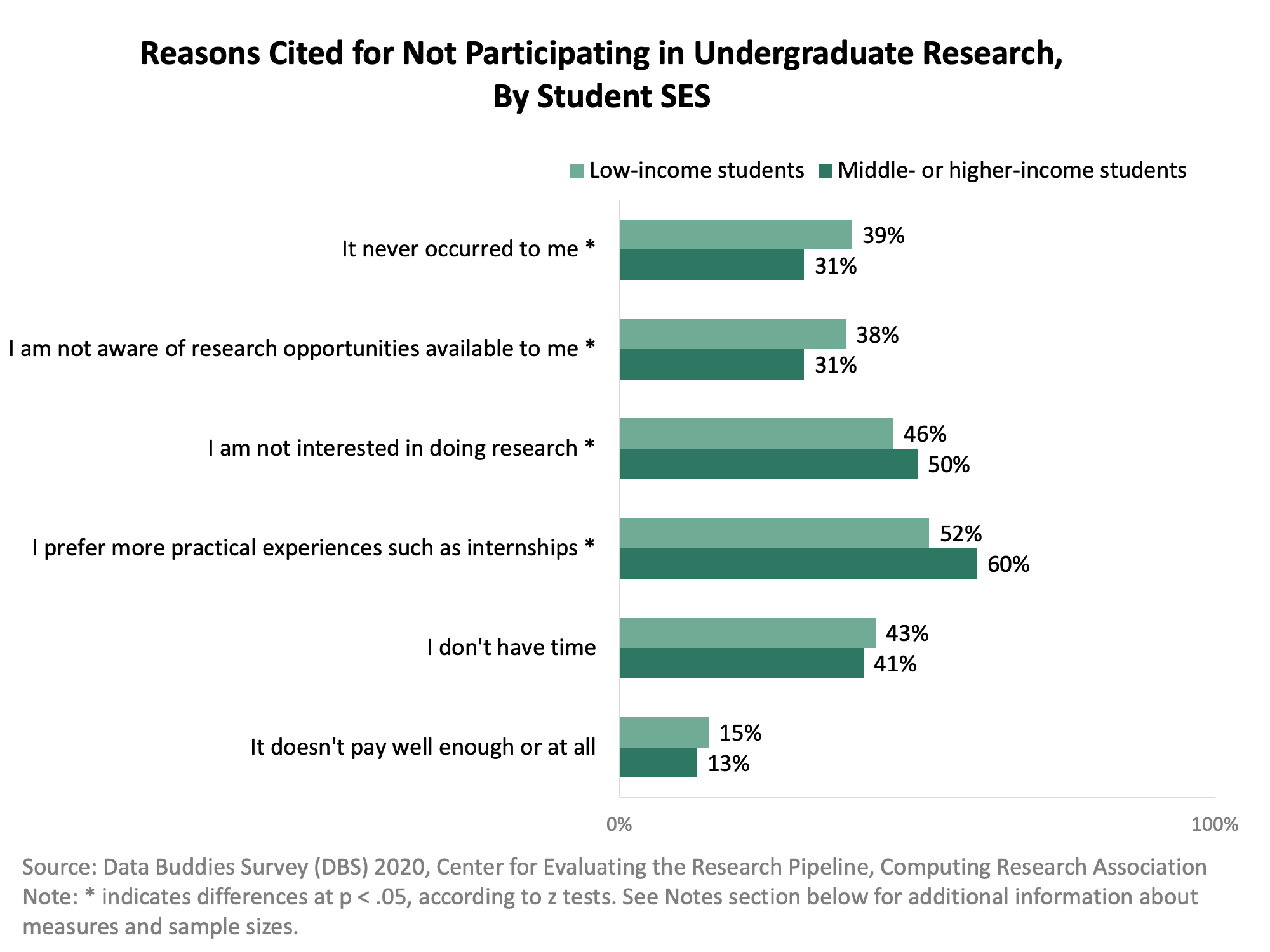Compared to Peers, Students from Low-Income Backgrounds Report Less Awareness of – but Greater Interest in – Formal Research Experiences

Previous CERP analyses have broadly examined why undergraduate students do not participate in formal research experiences. Findings have shown that the most commonly-cited reasons for non-participation include preferring a more applied research experience such as an internship, lack of awareness of research opportunities, and not having enough time.
The current analyses begin to unpack these findings by looking at whether reasons for not participating in research vary as a function of students’ backgrounds. Specifically, using 2020 Data Buddies Survey data, CERP examined whether students from self-reported low-income backgrounds cite the same reasons for non-participation in formal research experiences as their peers who come from middle- or high-income backgrounds.
Findings suggest that there are systematic differences in the reasons low- and high-income undergraduates are not engaging in research. Low-income students seem to be less informed about research and its potential applicability to them:
- Low-income students are significantly more likely than their peers to report that participating in research never occurred to them.
- They are also more likely than higher-income peers to report being unaware of research opportunities available to them.
At the same time, lack of interest in research seems to be less of an issue for low-income students than it is for higher income students:
- Low-income students are significantly less likely than their peers to say they are not interested in research.
- They are also less likely to express a preference for “more practical” experiences like internships.
Interestingly, concerns about the amount these research experiences pay, as well as concerns about having enough time to participate in research, did not differ as a function of students’ socioeconomic background.
Taken together, these findings suggest promising opportunities for engaging more low-income students in formal research. These data suggest that low-income students are more open to these experiences than their higher-income peers, but they need more information about research opportunities, coupled with individualized encouragement to participate.
Notes:
The survey data analyzed for this infographic were collected by Center for Evaluating the Research Pipeline via The Data Buddies Project.
Students responded to this question in the 2020 survey: “During your college career so far, have you participated in any formal research experiences? Formal research includes any experience you applied for and through which you worked closely with a mentor or research advisor.” Students who responded “No, I have NEVER participated in a formal research experience while I have been in college and I do not plan to” were asked: “Which of the following reasons explain why you do not plan to participate in a formal research experience? Choose up to 3 responses.”
Self-reported socioeconomic background was based on the following question: “Growing up, what do you think your family’s socioeconomic status was?” Respondents were classified as low-income if they chose either of the following responses: “Poor,” “Below average/ Lower middle class.” Respondents were classified as middle- or higher-income if they chose any of the following: “Average/middle class,” “Above average/Upper middle class,” or “Wealthy.” Responses shown are based on N = 868 low-income respondents and 2,306 middle- or higher-income respondents. Responses for low-income versus middle- or higher-income respondents were compared using a z-test with statistical significance indicated for p < .05.
 This analysis is brought to you by the CRA’s Center for Evaluating the Research Pipeline (CERP). CERP provides social science research and comparative evaluation for the computing community. Subscribe to the CERP newsletter here. Volunteer for Data Buddies by signing up here.
This analysis is brought to you by the CRA’s Center for Evaluating the Research Pipeline (CERP). CERP provides social science research and comparative evaluation for the computing community. Subscribe to the CERP newsletter here. Volunteer for Data Buddies by signing up here.
This material is based upon work supported by the National Science Foundation under grant numbers CNS-1246649, DUE-1431112, DUE-1821136, and/or CNS 2036717. Any opinions, findings, and conclusions or recommendations expressed in this material are those of the author(s) and do not necessarily reflect the views of the National Science Foundation.









